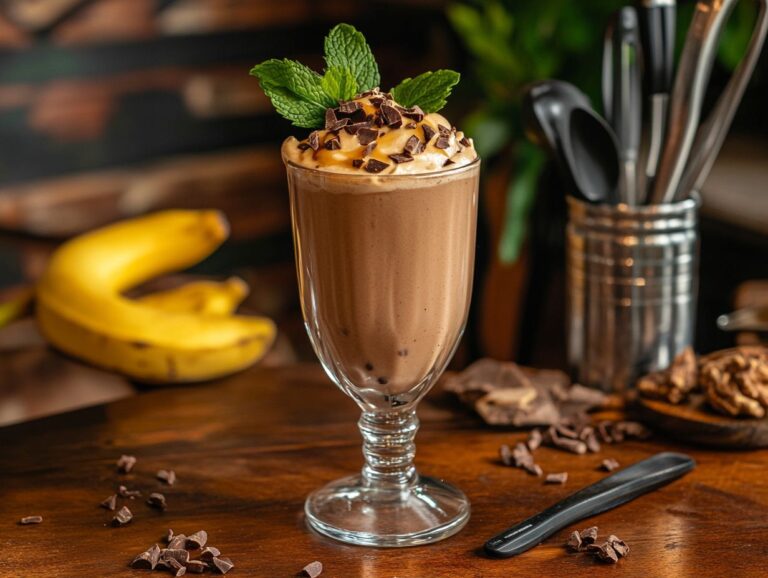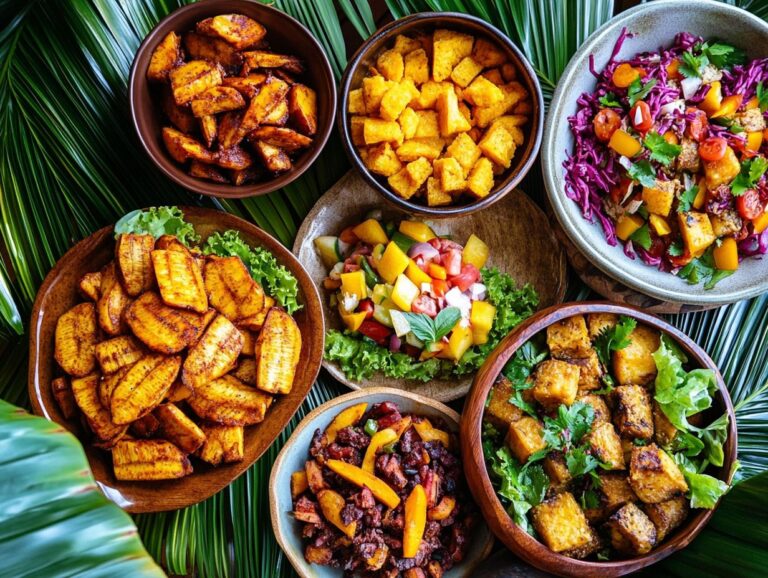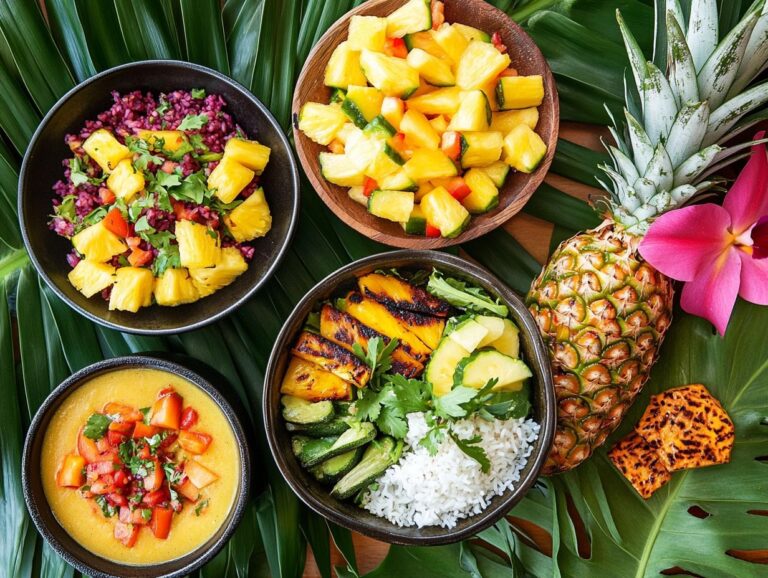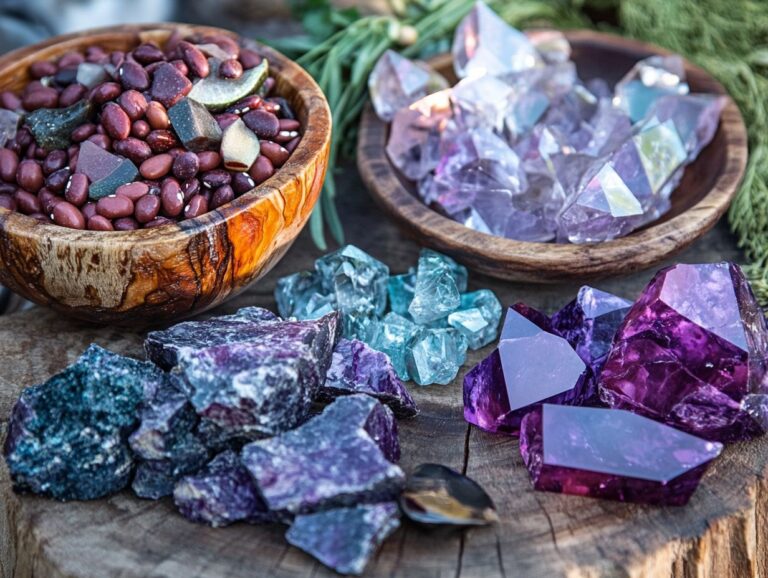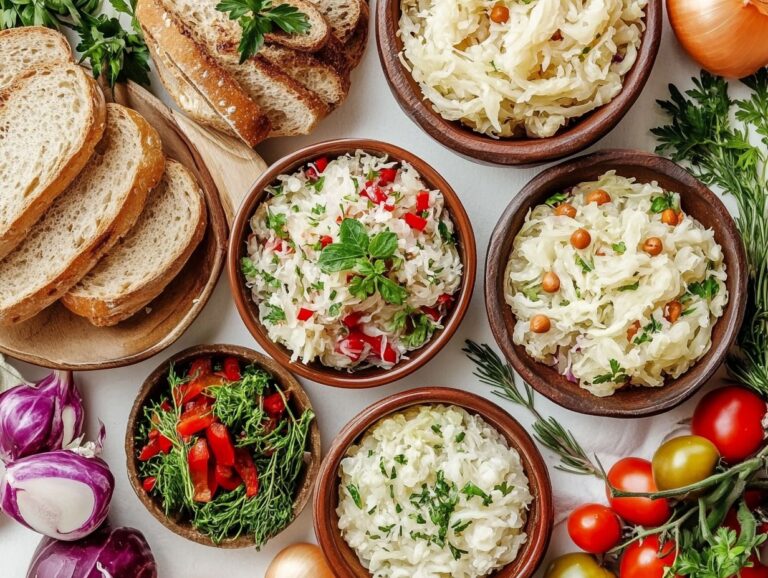This article explores the vibrant world of vegan Jamaican cuisine, where traditional flavors intersect with modern dietary choices. It provides in-depth research into the rich history and influences behind these dishes, highlighting their numerous health and environmental benefits. You will find descriptions of the essential Jamaican ingredients that form the backbone of this culinary tradition, along with easy, step-by-step recipes to help you bring these flavors into your kitchen. Additionally, the article offers creative twists on classic dishes and tips to ensure your meals are infused with authentic Jamaican taste.
History and Influences
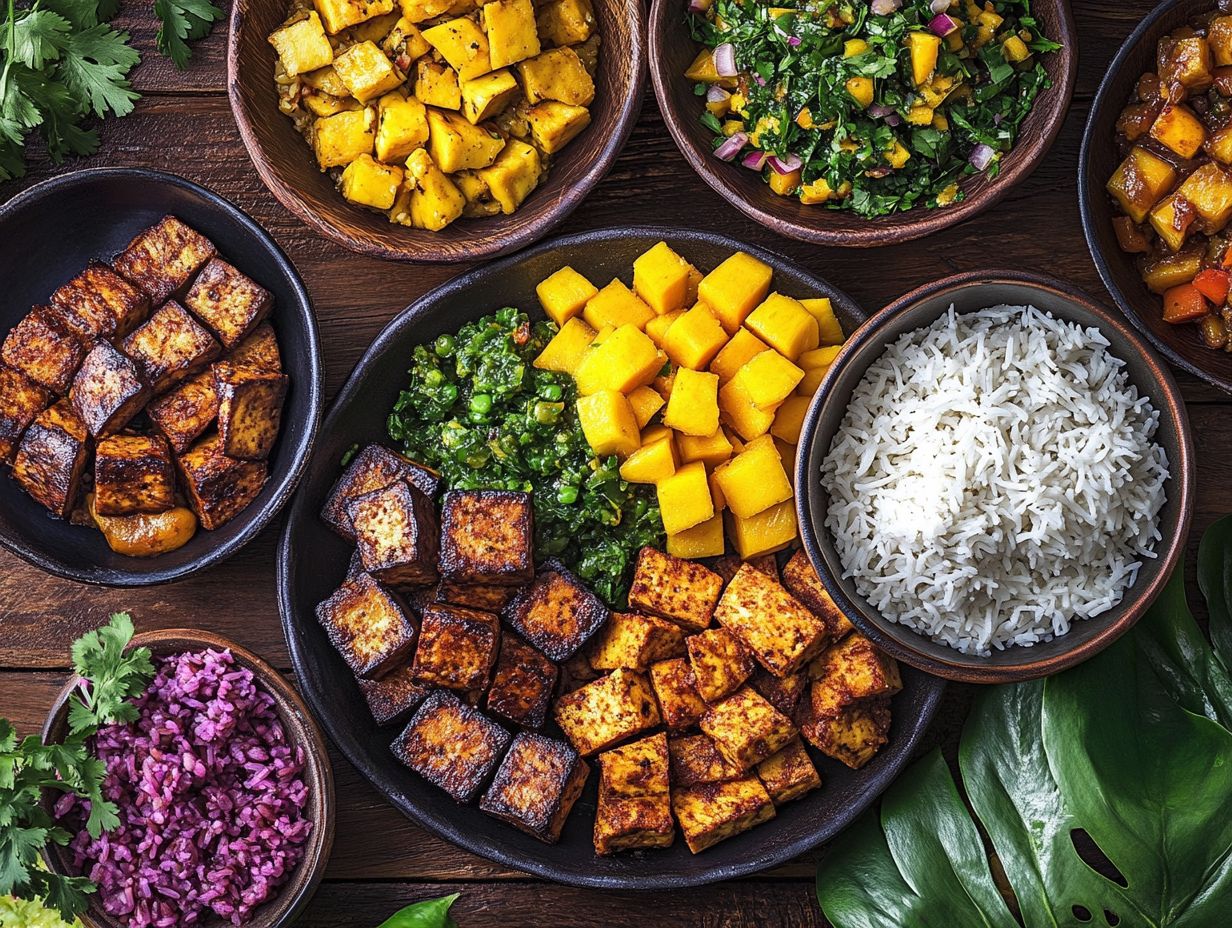 The history of Jamaican cuisine is a rich tapestry woven from African, Spanish, British, and Indian cultural influences, all of which have shaped the culinary heritage of the island. These diverse influences are evident in the spices, techniques, and ingredients that define local dishes, ranging from the fiery heat of Scotch bonnet peppers to the aromatic additions of allspice. The Rastafarian movement, which emerged in the early 20th century, significantly influenced culinary practices on the island by advocating for the Ital diet, which emphasizes health and sustainability. This shift towards natural foods has elevated the status of traditional dishes like ackee and saltfish and fostered a greater appreciation for local produce such as callaloo and yam. The dynamic evolution of Jamaican food narrates a story of resilience and creativity, firmly establishing it as a cherished aspect of Caribbean culture.
The history of Jamaican cuisine is a rich tapestry woven from African, Spanish, British, and Indian cultural influences, all of which have shaped the culinary heritage of the island. These diverse influences are evident in the spices, techniques, and ingredients that define local dishes, ranging from the fiery heat of Scotch bonnet peppers to the aromatic additions of allspice. The Rastafarian movement, which emerged in the early 20th century, significantly influenced culinary practices on the island by advocating for the Ital diet, which emphasizes health and sustainability. This shift towards natural foods has elevated the status of traditional dishes like ackee and saltfish and fostered a greater appreciation for local produce such as callaloo and yam. The dynamic evolution of Jamaican food narrates a story of resilience and creativity, firmly establishing it as a cherished aspect of Caribbean culture.
Benefits of Vegan Jamaican Recipes
The benefits of vegan Jamaican recipes lie in their foundation of a nutrient-rich plant-based diet, combined with traditional Jamaican cooking methods that emphasize fresh and wholesome ingredients. The shift towards veganism in Jamaica reflects a growing cultural movement that prioritizes health, sustainability, and ethical practices. This appeal of veganism offers hearty meals and comforting dishes that do not compromise on taste, rooted in the vibrant traditions of Jamaican cuisine.
Health and Environmental Benefits
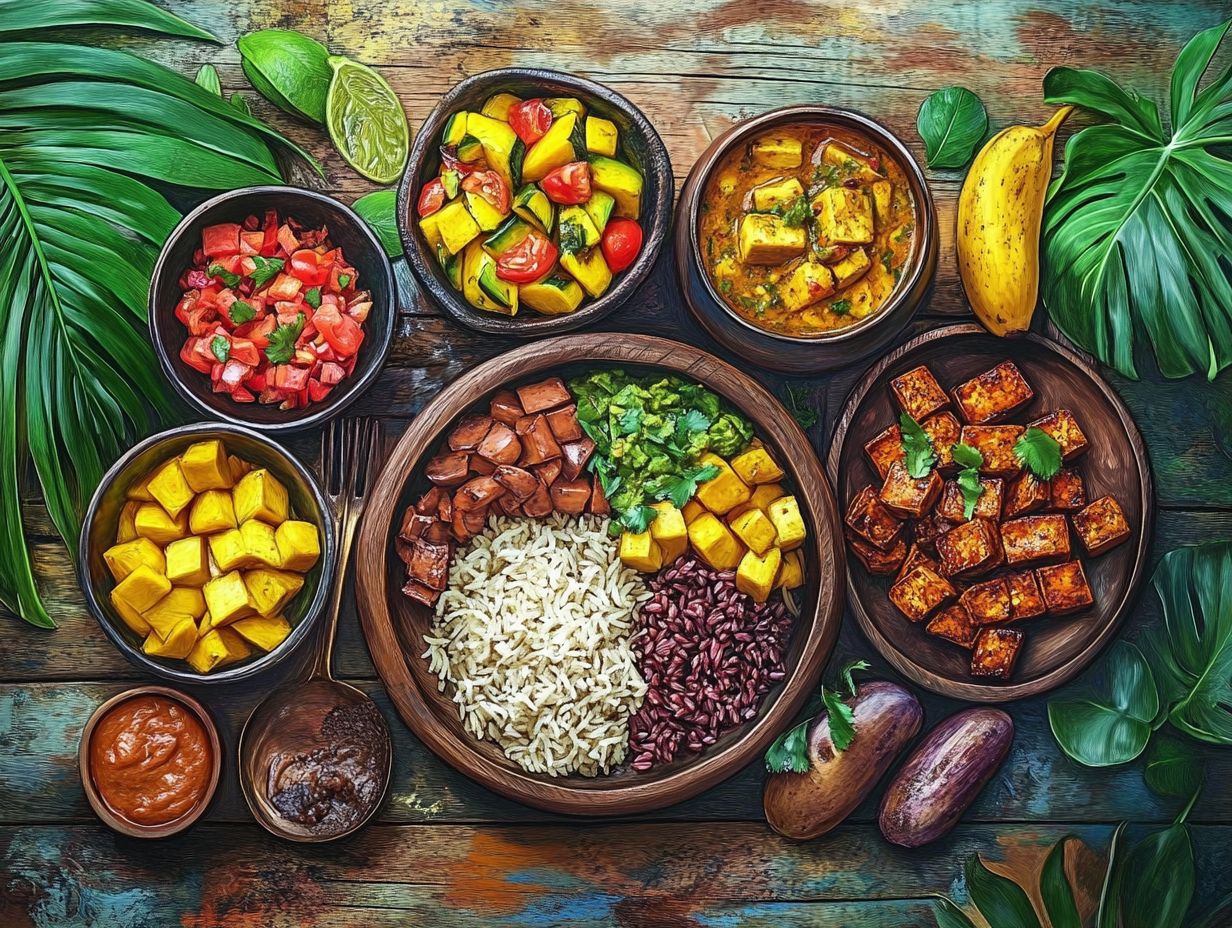 Vegan Jamaican recipes facilitate the adoption of a plant-based diet that offers personal health benefits, such as weight management and a lower risk of chronic diseases, while also reducing the environmental impact associated with animal agriculture. One of the primary personal health advantages of a plant-based diet is effective weight management, but individuals may also experience improved heart health due to lower cholesterol levels and better regulation of blood pressure. Additionally, a higher fiber intake can enhance digestion by supporting gut health and promoting regularity. On a broader scale, shifting away from diets rich in animal products encourages sustainable farming practices that reduce water usage and minimize deforestation. The vibrant vegetables, grains, and legumes featured in healthy Jamaican recipes provide a diverse array of nutrients, and transitioning to plant-based eating significantly lowers resource consumption and greenhouse gas emissions, aligning with the principles of the Ital diet promoted by the Rastafarian movement. This approach allows individuals to align their commitment to personal well-being with a dedication to environmental health.
Vegan Jamaican recipes facilitate the adoption of a plant-based diet that offers personal health benefits, such as weight management and a lower risk of chronic diseases, while also reducing the environmental impact associated with animal agriculture. One of the primary personal health advantages of a plant-based diet is effective weight management, but individuals may also experience improved heart health due to lower cholesterol levels and better regulation of blood pressure. Additionally, a higher fiber intake can enhance digestion by supporting gut health and promoting regularity. On a broader scale, shifting away from diets rich in animal products encourages sustainable farming practices that reduce water usage and minimize deforestation. The vibrant vegetables, grains, and legumes featured in healthy Jamaican recipes provide a diverse array of nutrients, and transitioning to plant-based eating significantly lowers resource consumption and greenhouse gas emissions, aligning with the principles of the Ital diet promoted by the Rastafarian movement. This approach allows individuals to align their commitment to personal well-being with a dedication to environmental health.
Traditional Jamaican Ingredients
Traditional Jamaican cuisine is renowned for its use of fresh ingredients, which are essential for creating authentic flavors in its dishes. Staples such as ackee, plantains, rice and peas, and coconut not only define the culinary landscape of Jamaica but also contribute to the rich tapestry of tastes and textures found in its traditional offerings.
Common Ingredients and their Uses
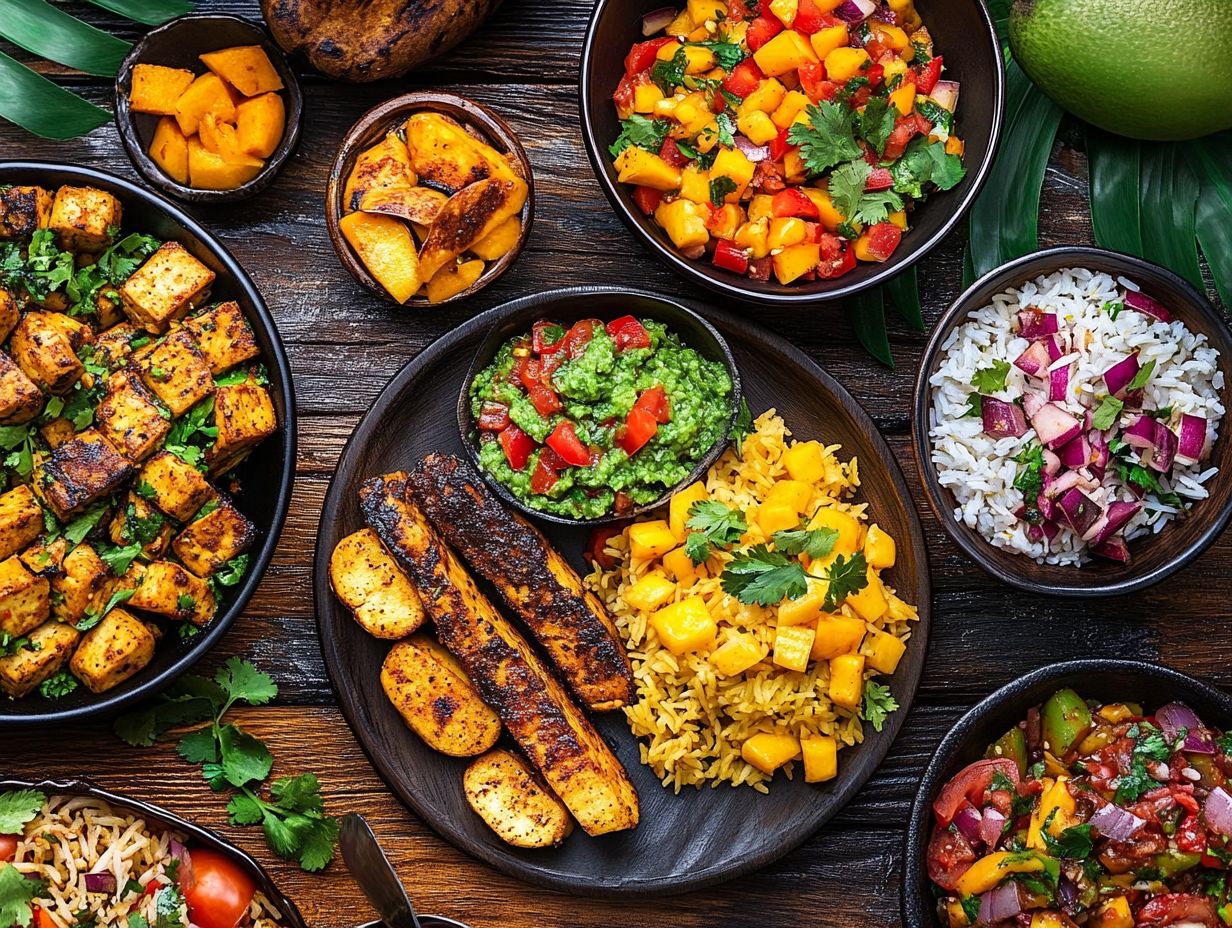 Common ingredients in Jamaican cuisine include jackfruit, jerk seasoning, callaloo, and sweet potato. These ingredients are often used in the preparation of savory stews and hearty meals. Jackfruit is an excellent meat substitute in Jamaican recipes, such as jerk jackfruit tacos, where its fibrous texture absorbs spices well and provides a rich flavor. Jerk seasoning, which contains allspice, thyme, and Scotch bonnet peppers, imparts a fire-kissed taste to dishes and boasts antioxidant properties. Callaloo, similar to spinach, can be saut ed with garlic and onions to create a delicious side dish or added to soups for extra flavor. Sweet potato is rich in vitamins and fiber, making it a nutritious component of various dishes. A fantastic Jamaican recipe that highlights this vegetable is roasted sweet potato salad, which showcases its natural sweetness while balancing it with savory elements.
Common ingredients in Jamaican cuisine include jackfruit, jerk seasoning, callaloo, and sweet potato. These ingredients are often used in the preparation of savory stews and hearty meals. Jackfruit is an excellent meat substitute in Jamaican recipes, such as jerk jackfruit tacos, where its fibrous texture absorbs spices well and provides a rich flavor. Jerk seasoning, which contains allspice, thyme, and Scotch bonnet peppers, imparts a fire-kissed taste to dishes and boasts antioxidant properties. Callaloo, similar to spinach, can be saut ed with garlic and onions to create a delicious side dish or added to soups for extra flavor. Sweet potato is rich in vitamins and fiber, making it a nutritious component of various dishes. A fantastic Jamaican recipe that highlights this vegetable is roasted sweet potato salad, which showcases its natural sweetness while balancing it with savory elements.
Easy Vegan Jamaican Recipes
Creating simple vegan Jamaican recipes can be an enjoyable experience, as they promote healthy meal preparation. These easy vegan recipes offer hearty meals bursting with vibrant flavors, highlighting delicious alternatives to traditional ingredients, and they are perfect for sharing on Instagram. Popular Jamaican desserts like sweet potato pudding can also be adapted into vegan-friendly versions, making them ideal for Instagram recipes.
Step-by-Step Instructions
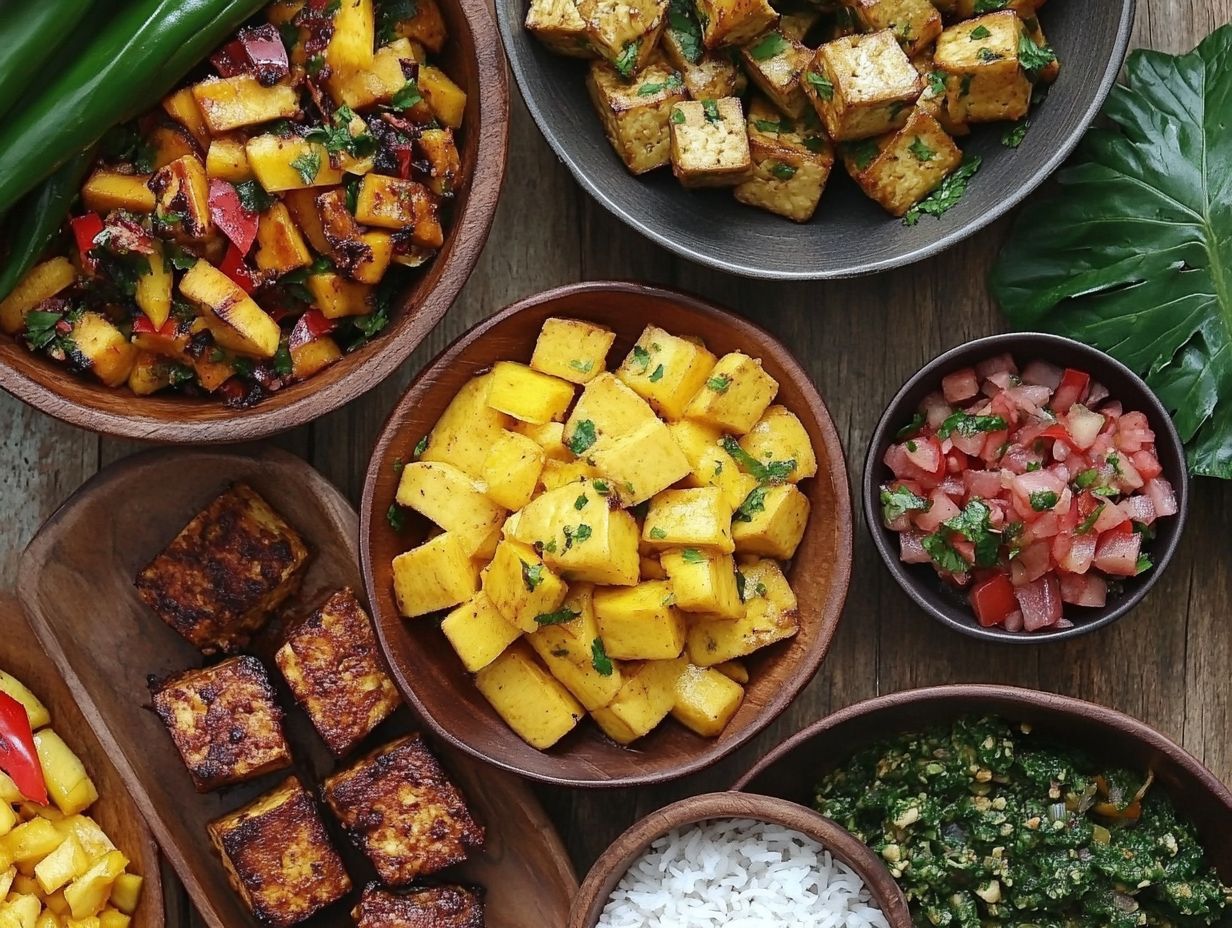 Vegan Jamaican recipes offer simple, step-by-step instructions that guide cooks through essential methods for creating plant-based culinary experiences. These instructions typically encompass everything from ingredient preparation and cooking techniques to the desired final results. Selecting the right ingredients is crucial for highlighting the unique flavors of Jamaican cuisine. Fresh, local produce and authentic spices are vital for crafting delicious and authentic Jamaican dishes. For instance, ripe plantains, fresh bell peppers, thyme, and scallions are key components in many traditional Jamaican favorites. Choosing appropriate cooking techniques for vegan Jamaican recipes ensures that the flavors are enhanced while preserving their nutritional value. Common methods in Jamaican cuisine include:
Vegan Jamaican recipes offer simple, step-by-step instructions that guide cooks through essential methods for creating plant-based culinary experiences. These instructions typically encompass everything from ingredient preparation and cooking techniques to the desired final results. Selecting the right ingredients is crucial for highlighting the unique flavors of Jamaican cuisine. Fresh, local produce and authentic spices are vital for crafting delicious and authentic Jamaican dishes. For instance, ripe plantains, fresh bell peppers, thyme, and scallions are key components in many traditional Jamaican favorites. Choosing appropriate cooking techniques for vegan Jamaican recipes ensures that the flavors are enhanced while preserving their nutritional value. Common methods in Jamaican cuisine include:
- Steaming
- Saut ing
- Grilling
Steaming vegetables, for example, helps retain their bright colors and crunch, making the final dish not only nutritionally rich but also visually appealing and appetizing. Using coconut milk as a base for savory stews is another way to enhance the taste. To achieve a truly authentic finish, vegan Jamaican recipes are often garnished with a sprinkle of fresh chopped herbs or a drizzle of coconut sauce.
Adding a Twist to Classic Dishes
The adaptation of traditional Jamaican cuisine with innovative twists and creative variations offers recipes for classic dishes in vegan alternatives. These adaptations provide comforting food options that preserve the essence of traditional Jamaican meals while replacing animal-based ingredients with plant-based sources.
Creative Variations and Substitutions
Innovative variations and substitutions for Jamaican recipes can be created using plant-based ingredients such as jackfruit and lentils, both of which are excellent sources of protein and texture. Hearts of palm can also be used in vegan alternatives to traditional saltfish dishes, providing a unique twist to classic comfort food options. By experimenting with different components, the essence of traditional Jamaican recipes can be maintained while offering flavorful and unique alternatives to common preparations. For instance, shredded jackfruit can serve as a substitute for chicken in a savory jerk dish, mimicking the meat’s texture in a completely plant-based version. Quinoa can replace traditional rice, providing a similar texture along with higher protein content and a subtle nutty flavor. Perhaps the most nutritious and delicious variation of a Jamaican stew would involve substituting ground beef with black beans. These thoughtful ingredient choices create delightful meals that honor the spirit of Jamaican cuisine and culture.
Tips for Authentic Jamaican Flavors
Incorporating traditional spices and cooking techniques is essential for achieving authentic Jamaican flavors in vegan recipes, as they provide the depth and complexity needed to enhance the taste of dishes. Techniques such as marinating with jerk seasoning or using fresh herbs like thyme can transform a basic dish into an extraordinary meal.
Spices and Techniques for Flavorful Dishes
Key spices and techniques, such as jerk seasoning, thyme, Scotch bonnets, and curry, play a vital role in enhancing the flavor profiles of vegan Jamaican dishes, making them not only delicious but also reminiscent of traditional culinary practices. These spices are essential for creating authentic Jamaican flavors that reflect the island’s rich heritage. For example, jerk seasoning infuses plant-based proteins like tofu and tempeh with its signature smoky and spicy notes, while thyme adds a fresh herbal brightness that elevates the overall dish. The fiery Scotch bonnets can be used to create a vibrant hot sauce or infused into stews, delivering a kick that beautifully complements hearty vegetables. Coconut curry can transform a simple chickpea dish into a flavorful sensation, skillfully merging spices to captivate the palate. Consider dishes like jerk tofu stir-fry or coconut chickpea curry; these delightful recipes illustrate how these spices can be seamlessly integrated into vegan Jamaican cuisine, offering an enjoyable experience for anyone craving the island’s unique flavors.

